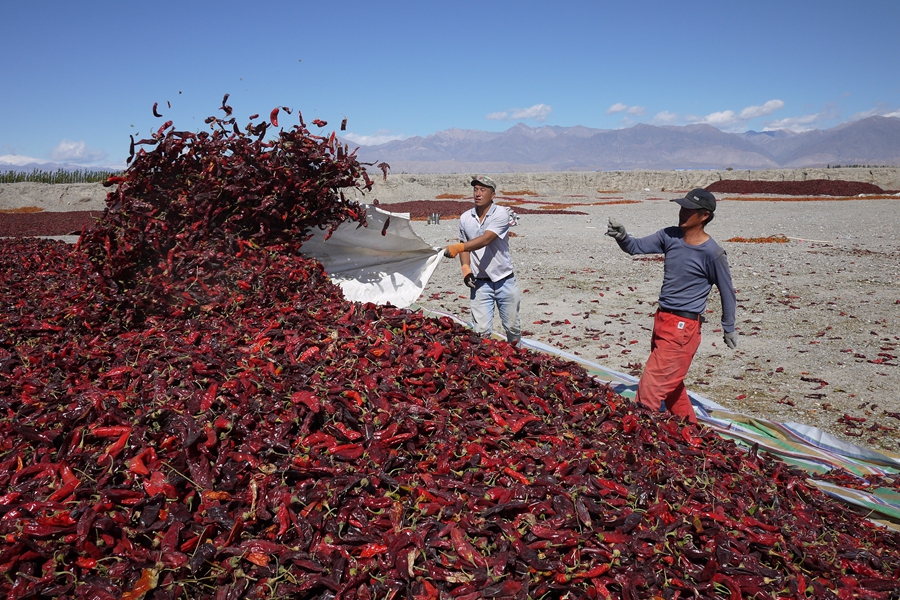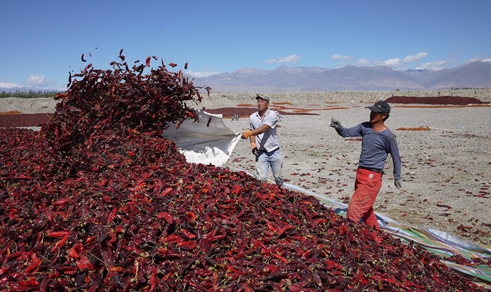Prosperous pepper business connects Xinjiang and Qingdao
 0 Comment(s)
0 Comment(s) Print
Print E-mail China.org.cn, November 2, 2017
E-mail China.org.cn, November 2, 2017
 |
|
Farmers are drying out peppers in Xinjiang [Photo by Liu Dai/Qingdao Today] |
Pepper processing companies in Jiaozhou, a county-level city under the jurisdiction of Qingdao, Shandong, are the buyers of two thirds of the 300,000 metric tons’ pepper production of Xinjiang Uygur autonomous region at present.
Jiaozhou is the largest pepper processing and exporting center in China, taking up a 70 percent market share. 365 pepper processing companies operate within its jurisdiction, including 25 companies each with annual sales revenue upwards of 100 million yuan.
Prompted by the booming pepper industry, approximately 200 Jiaozhou dealers have been active in Xinjiang, the region that provides ideal climate for pepper plantations with ample sunlight, significant temperature differences, and long frost-free seasons.
Xinjiang is also one of the few regions in the world that are suitable for large scale production of sweet pepper, a source for extraction of capsanthin, a natural coloring matter for making cosmetics, and a means for increasing incomes for local villagers.
In Hejing county, through cooperation with Qingdao-based food company Bo Lan, quite a few villagers have multiplied their incomes over the past few years.
Bo Lan’s chairman Guo Peizheng said that through several trials they determined that Xinjiang is the most suitable place for sweet pepper planting in the world. The vast deserts of Xinjiang offers ideal sites for sweet peppers to dry out with the flavors and rich color gradation being kept.
The company has engineered an innovative way of cooperation with local farmers, in which they supply pepper seeds free of charge and sign purchase contracts with minimum purchasing prices attached to ensure a certain level of income for the pepper growers in Hejing, where sweet pepper planting area grew to exceed 10100 hectares, around one third of the total agricultural acreage in the county, from nearly zero 10 years ago.
By switching production from wheat and corn to sweet pepper, the farmers in the county elevated their annual income from only 300 yuan to 3,000 yuan per 0.06 hectare. Many of them have bought automobiles and built new residences with the increased earnings.
Recently the pepper industry is undertaking a shift from raw material production to deep processing in Xinjiang, as an increasing number of Qingdao enterprises are making business moves in the region.
And Jiaozhou is leading these entrepreneurial efforts, with more than 100 pepper processing companies from the city operating in places including Hotan, Korla, Akesu, and Kashi.
Eight producers of pepper pigment, established by Jiaozhou enterprises, produce red pigment of 5,000 metric tons and generate 3 billion yuan of output value annually.
Improving logistic infrastructure has been facilitating the transportation between Qingdao, Xinjiang and Europe, benefiting the pepper business.
One of the railway services launched by CRIntermodal’s Qingdao center provides smooth and convenient cargo transportation between Jiaozhou and Urumqi, capital of Xinjiang. And thanks to the development of the Belt and Road Initiative, processed peppers can be transported to Europe from Xinjiang within eight days.





Go to Forum >>0 Comment(s)